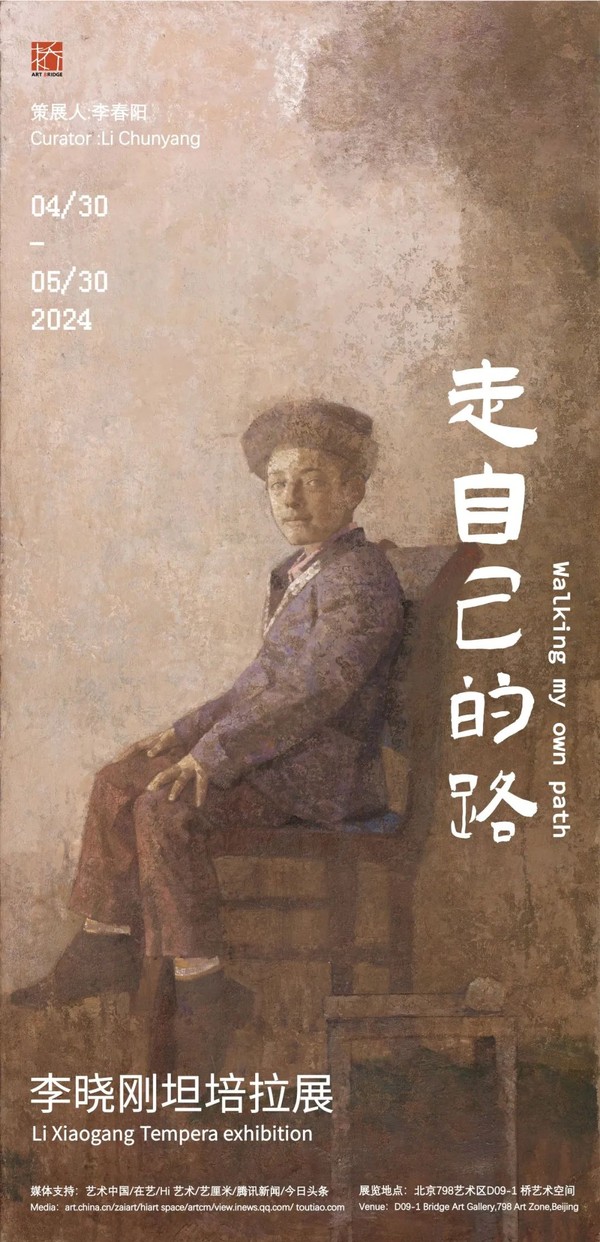
《走自己的路—李晓刚坦培拉展》
Walking My Own Path
——Exhibition By Li Xiaogang In Tempera
艺术家:李晓刚
Artist:Li Xiaogang
策展人:李春阳
Curator:Li Chunyang
主办单位:桥艺术空间
Organizer:Art Bridge Gallery
开幕时间:2024年04月30日 下午3:30
Opening:Apr.30,2024 at 3:30 p.m
展览时间:2024年04月30日—2024年05月30日
Exhibition Date:Apr.30,2024 — May.30,2024
展览地点:北京798艺术区D09-1 桥艺术空间
Venue:D09-1,798 Art Zone,Beijing,Art Bridge Gallery
媒体支持:艺术中国/在艺/Hi 艺术/艺厘米/腾讯新闻/今日头条
Media:art.china.cn /zaiart /hiart space /artcm /qq.com /toutiao.com
走自己的路 —— 李晓刚坦培拉展
我们都很尊敬的前辈钟涵先生,经常谈及以中央美术学院为主导的中国油画体系分为学苏、学欧两大分支,各有其渊源,作为学欧的一脉,钟先生曾有过本体论的定义与推重。我们晚辈后学,大抵沿着学院派的脉络,往前推进自我的艺术追求。
李晓刚先生上世纪八十年代从解放军艺术学院油画专业毕业,后入中央美术学院深造,他从中国油画专业的传承中,走出了一条属于他自己的个人道路,这条道路寂寞而特殊,艰辛而诚挚:
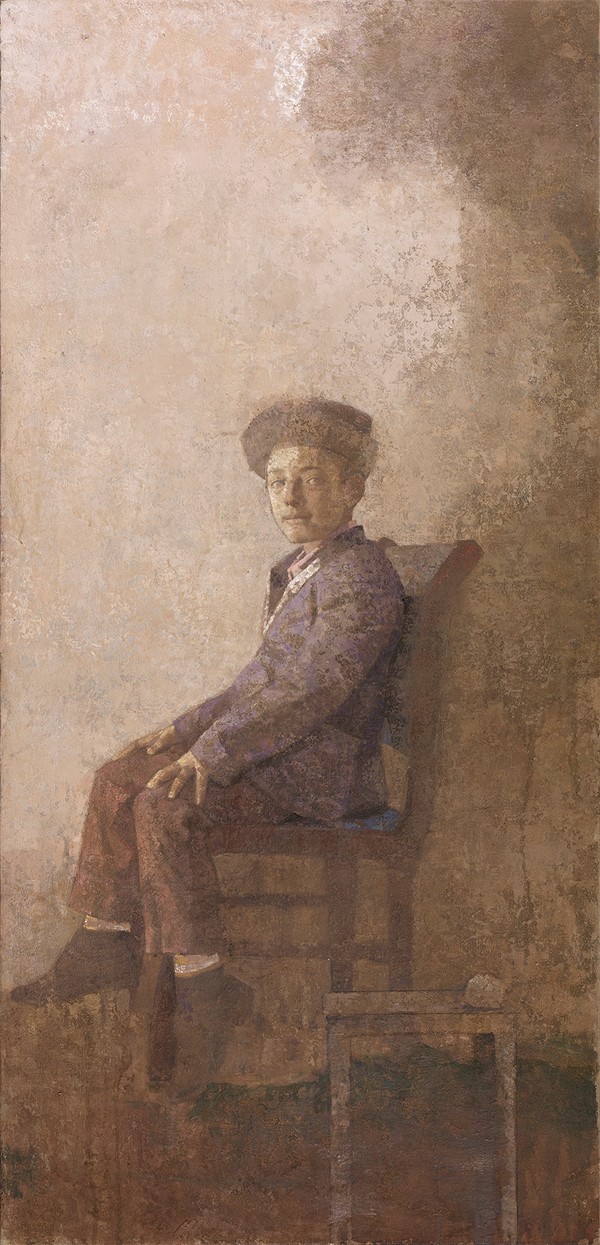
▲《茶色时刻》Time of Dark Brown
酪素坦培拉 Casein tempera
154x40cm 2024年
他赴日本二十多年,从湿壁画入手,全面探寻和研究了欧洲坦培拉绘画技艺的根源。从日本出发,足迹遍布意大利、比利时、荷兰、美国等,寒来暑往,岁月更迭,艺术上的朝圣、取经,终于落实为个人的艺术成长与成熟,成为了坦培拉技法集大成的中国油画家!他对尼德兰技法的醇熟运用,令人叹为观止,其代表作品皆可为证,这次展出的《蓝衣》,将鲜活的当代人物,置身于历史时间浸润的斑驳陆离的酪素色彩肌理之内,参以日本物哀的美学情致,形成了某种可意会而难以表现的神圣而神秘的意味,画面所呈现的敏锐度和敏感性很强,显示了画家以精湛的尼德兰风格对东方人物形象的塑造。
走自己的路——这是一条欧洲古典油画技法地道熟练的运用之路,随着李晓刚先生新作的增多,随着他在中国较为全面的坦培拉技法教学丰硕成果的积累,这条道路已经越来越显示了他与当代中国油画家的路径有所不同!
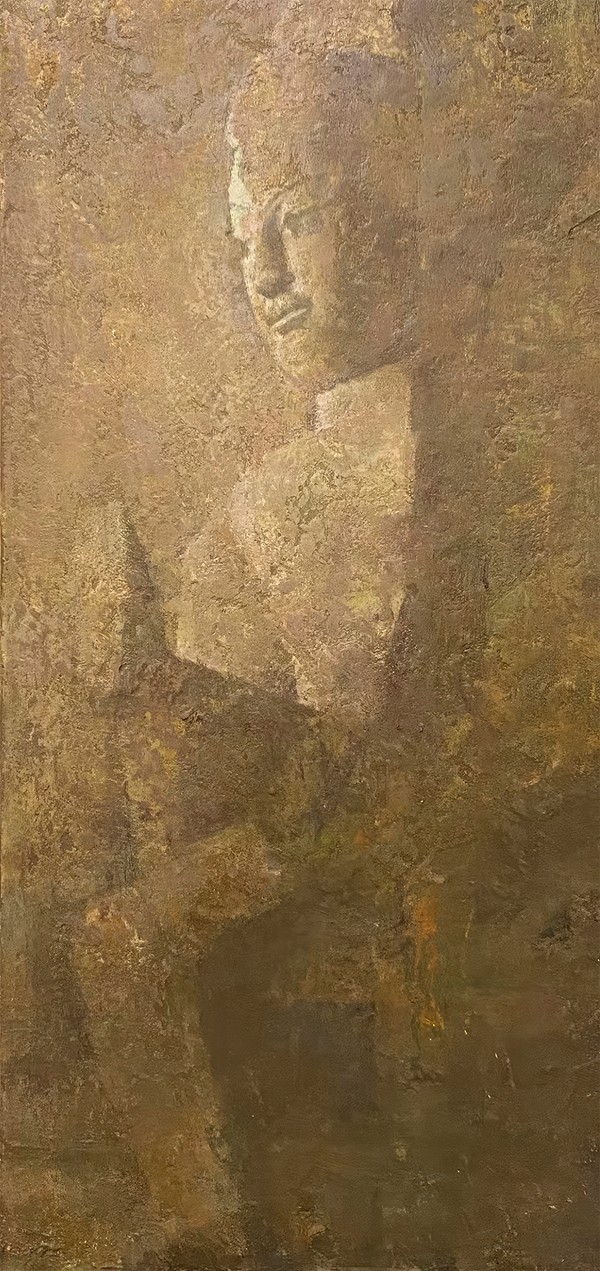
▲《佛壁》 Buddhist Wall
酪素坦培拉 Casein tempera
100x60cm 2022年
这次展出的作品,多为李晓刚先生近年新作,显示了艺术家在多种技法运用上的新思路。材料以酪素坦培拉为主,复杂的中性色调,剥蚀的时光之感,与宁静寂寥近乎神性的气质统一。写实性的绘画,如何兼容画家在表现与抽象上的追求,这绝对是一个艺术上的难题,许多画家或许偏重其一,李晓刚的艺术同时拥有高度的写实能力、材料的特殊性和风格的抽象构成,三者浑然一体。
坦培拉艺术史各个时期的画法,李晓刚先生皆有深入的研究,比如《拉卜愣寺众僧》是油与蛋的悬浊液油画,这种天鹅绒般的蛋彩光泽,其浓重的笔触属于提香以后的画法了,画面衣纹直如文艺复兴圣像画。藏民的精神信仰如何传达,其民族性的感受究竟如何传达,这对油画家都是考验,物品服饰肤色动态天光云影易捕捉,而灵魂却难表现,弄不好就成了风情画风俗画,这幅雕塑群像作品,使我们领略到坦培拉的魅力,也感受到其精神性的存在,好的艺术家,必须时刻面对技与道的关系。
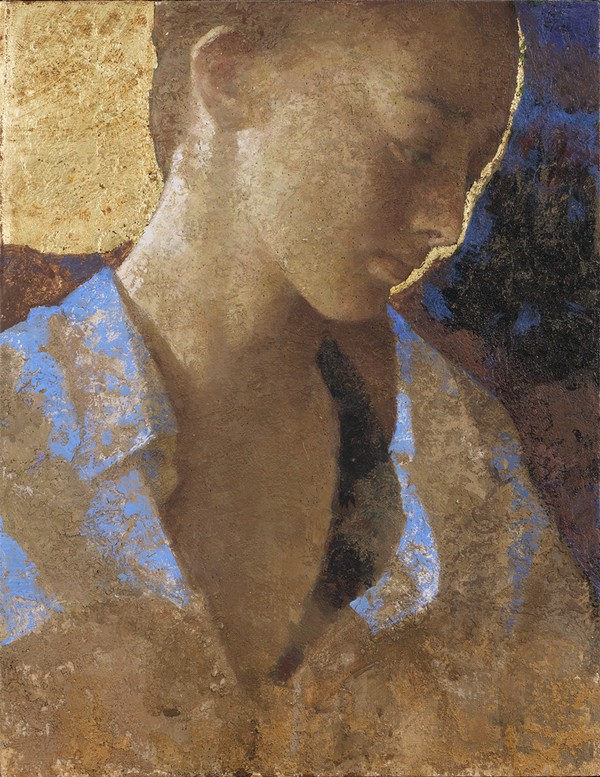
▲《蓝衣》 Blue Dress
酪素坦培拉混合 Casein tempera Mix
40x30cm 2024年
坦培拉的材料、技法经久不衰,利用乳液与油及水的结合,既古老又现代,它能与很多新的综合材料结合,创造出符合艺术家个性的绘画风格,当代油画家面对坦培拉选择,需要给出自己的回答——坦培拉贯穿着整个欧洲油画的历史,只有潜心深入研究欧洲技法,在此基础上,才有可能探索我们本民族性的独特表现,中国油画无法隔过去坦培拉这极其重要的一课!
坦培拉“包浆”意涵的历史感,加之画家追求的象征和暗喻,使李晓刚先生选择了坦培拉技法,这既是他的历史眼光,也是其技法上的个人偏好,他是中国同行的先行者之一。作为当代中国油画家,他越是深入研究,越是充满着对这个学科的责任!
李春阳
中国艺术研究院美术研究所
4月18日于北京
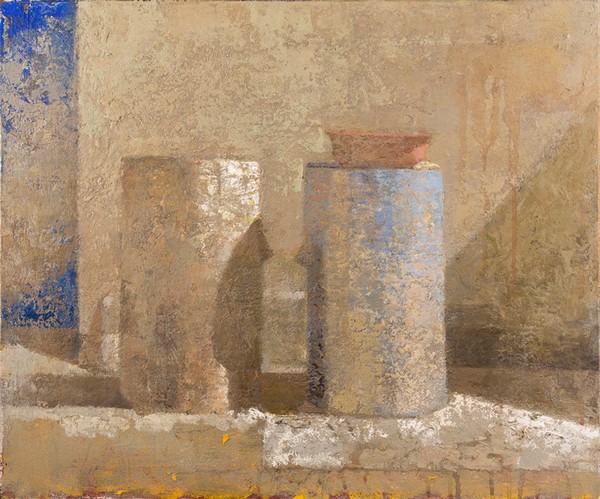
▲《两个铁皮桶》 Two Tin Barrels
酪素坦培拉 Casein tempera
50x60cm 2022年
Walking My Own Path
— Exhibition by Li Xiaogang in Tempera
We all hold great respect for Mr. Zhong Han, our esteemed senior, who often discusses the Chinese oil painting system dominated by the Central Academy of Fine Arts, divided into two main branches: learning from the Soviet Union and learning from Europe. Each branch has its origins. As a representative of the European branch, Mr. Zhong once defined and emphasized ontology. We, the younger generation, generally follow the tradition of the academy and advance our own artistic pursuits.
Mr. Li Xiaogang graduated from the Oil Painting Department of the Liberation Army Art Academy in the 1980s and later pursued further studies at the Central Academy of Fine Arts. From the heritage of Chinese oil painting, he carved out his own path, which is lonely yet unique, arduous yet sincere:
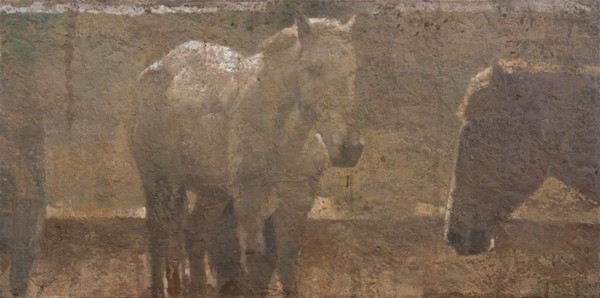
▲《两匹老马》 Two Old Horses
酪素坦培拉 Casein tempera
60x100cm 2022年
He spent more than twenty years in Japan, starting with frescoes, thoroughly exploring and studying the roots of European tempera painting techniques. Starting from Japan, his journey took him through Italy, Belgium, the Netherlands, the United States, and more. Through seasons and years, his artistic pilgrimage and learning finally materialized into personal artistic growth and maturity, making him a Chinese oil painter who has mastered the tempera technique! His adept use of Netherlands techniques is remarkable, as evidenced by his representative works. The work "Blue Clothes" displayed in this exhibition vividly places contemporary figures within the mottled and textured colors imbued with the saturation of historical time. Combined with the aesthetic sentiment of Japanese “mono no aware”, it forms a sacred and mysterious meaning that is comprehensible yet difficult to express. The sharpness and sensitivity displayed in the paintings demonstrate the artist's skillful shaping of Eastern figures in the refined style of the Netherlands.
Walking one's own path—this is a path of proficient and authentic application of European classical oil painting techniques. With the increasing number of new works by Mr. Li Xiaogang, and with the accumulation of his comprehensive teaching achievements in Tempera techniques in China, this path has increasingly shown differences from other contemporary Chinese oil painters!
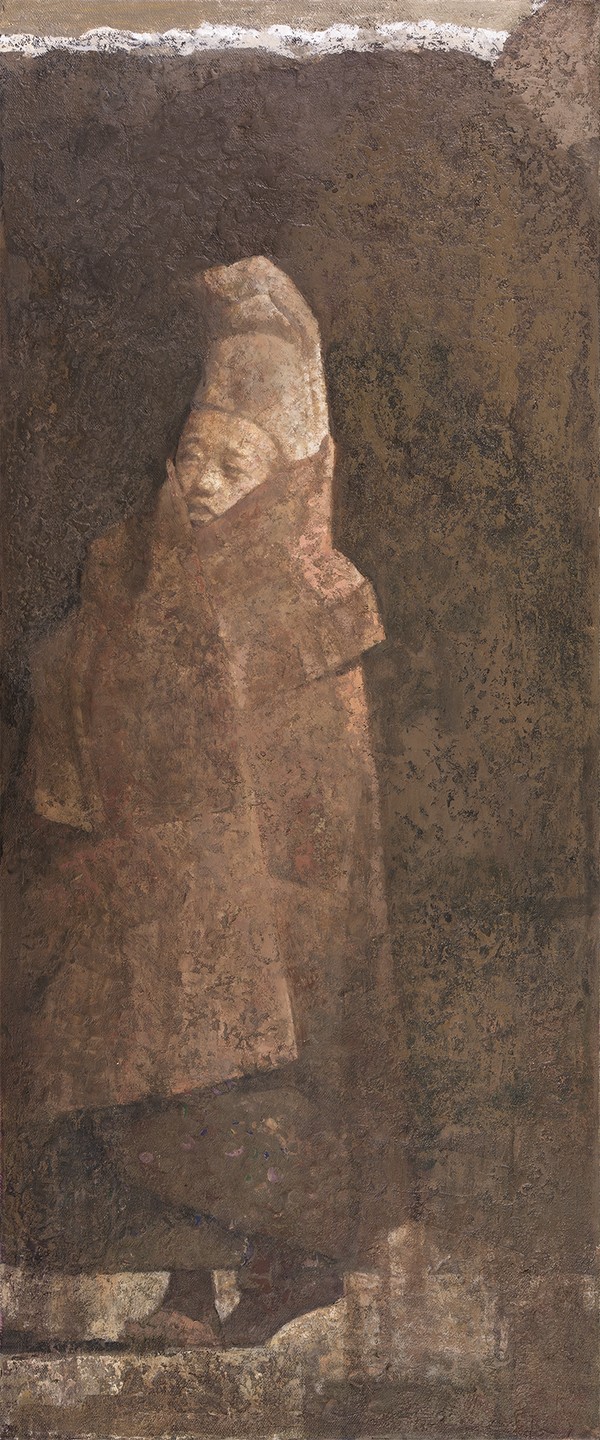
▲《山路小僧图》Small Monk On Mountain Path
酪素坦培拉 Casein tempera
154x40cm 2024年
The works displayed in this exhibition are mostly recent works by Mr. Li Xiaogang, showcasing the artist's new ideas in the application of various techniques. The use of casein tempera as the main material, the complex neutral tones, the sense of eroded time, and the almost divine tranquility and solitude are unified. Realistic painting, and how to reconcile the painter's pursuit of both representation and abstraction, is definitely an artistic challenge. Many painters may focus on one aspect, but Li Xiaogang's art simultaneously possesses a high level of realism, the uniqueness of materials, and abstract composition, all integrated seamlessly.
Mr. Li Xiaogang has conducted in-depth research on the painting techniques of various periods in tempera art history. For example, "Monks of Labrang Monastery" is an oil and egg suspension painting. The velvety tempera glaze and its heavy brushstrokes belong to the post-Titian era technique, and the folds in the garments are reminiscent of Renaissance icon paintings. How to convey the spiritual beliefs of the Tibetan people, and how to convey their ethnic feelings, are challenges for oil painters. While it's easy to capture the dynamics of objects, clothing, skin tones, and changing light and shadow, it's difficult to depict the soul. Otherwise, it might become a genre painting. This work allows us to appreciate the charm of tempera and feel the existence of its spirituality. A good artist must constantly confront the relationship between technique and philosophy.
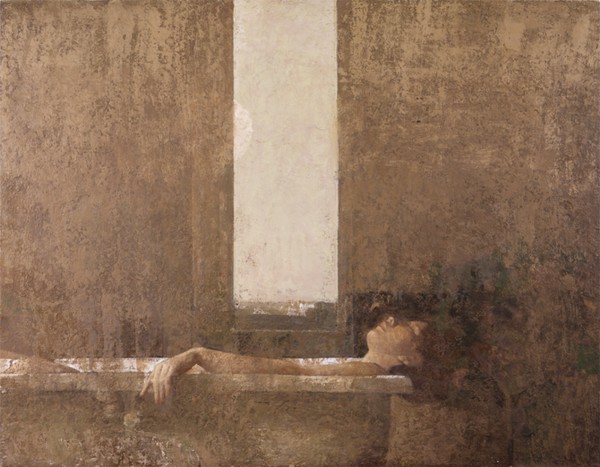
▲《浴》 Bathing
酪素坦培拉 Casein tempera
91x116cm 2024年
The materials and techniques of tempera have stood the test of time, using a combination of emulsion, oil, and water, making it both ancient and modern. It can be combined with many new composite materials to create a painting style that suits the artist's personality. Faced with the choice of tempera, contemporary oil painters need to provide their own answers. Tempera permeates the entire history of European oil painting. Only by dedicating oneself to in-depth study of European techniques can we explore our unique national expression. Chinese oil painting cannot overlook this extremely important lesson in tempera!
The historical significance implied by the "包浆"(patina) of tempera, combined with the symbols and metaphors pursued by the painter, led Mr. Li Xiaogang to choose the tempera technique. This is not only his historical perspective but also his personal preference in technique. He is one of the pioneers among Chinese artists. As a contemporary Chinese oil painter, the deeper his research, the more he feels the responsibility for this academic discipline!
Li Chunyang
China Academy of Art, Institute of Fine Arts
April 18th, Beijing

▲《长椅》 Bench
酪素坦培拉 Casein tempera
40x154cm 2024年
关于艺术家
About Artist
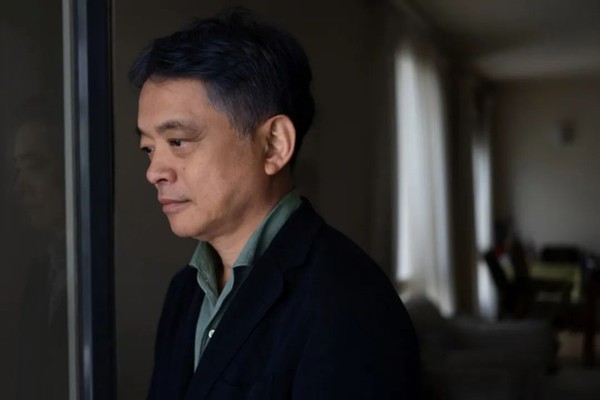
李晓刚 Li Xiaogang
李可染画院副院长、西方绘画研究室主任
韩国牧园大学博士导师、中国美术家协会会员
1983年 毕业于解放军艺术学院美术系
1989年 留学日本国立大阪教育大学美术系绘画技法专业研究生部(导师前田律雄)
1995年 任教于京都造型艺术大学 讲师
2002年 任职于日本国立大阪教育大学 讲师
2009年 中国解放军艺术学院兼职教授
2010年 中央美术学院造型研究所油画创作高研班
2012年 日本美术展评审员
2022年 应邀西班牙委拉斯贵支大奖赛评审员
Vice President of Li Keran Painting Institute、Director of the Western Painting Research Room、PhD Supervisor at Hanwool University、Member of China Artists Association.
1983 Graduated from the Fine Arts Department of the Liberation Army Art Academy.
1989 Studied in the Painting Techniques Graduate Department at the National Osaka University of Education in Japan (under the guidance of Maeda Norio).
1995 Appointed as a lecturer at Kyoto Zokei Art University.
2002 Appointed as a lecturer at the National Osaka University of Education in Japan.
2009 Part-time professor at the Liberation Army Art Academy in China.
2010 Attended the Oil Painting Creative Advanced Class at the Institute of Fine Arts, Central Academy of Fine Arts.
2012 Served as a judge for the Japan Art Exhibition
2022 Invited jury member of the Grand Prix of Vellas, Spain
转自:798桥艺术空间
Copyright Reserved 2000-2025 雅昌艺术网 版权所有
增值电信业务经营许可证(粤)B2-20030053广播电视制作经营许可证(粤)字第717号企业法人营业执照
 京公网安备 11011302000792号粤ICP备17056390号-4信息网络传播视听节目许可证1909402号互联网域名注册证书中国互联网举报中心
京公网安备 11011302000792号粤ICP备17056390号-4信息网络传播视听节目许可证1909402号互联网域名注册证书中国互联网举报中心
网络文化经营许可证粤网文[2018]3670-1221号网络出版服务许可证(总)网出证(粤)字第021号出版物经营许可证可信网站验证服务证书2012040503023850号